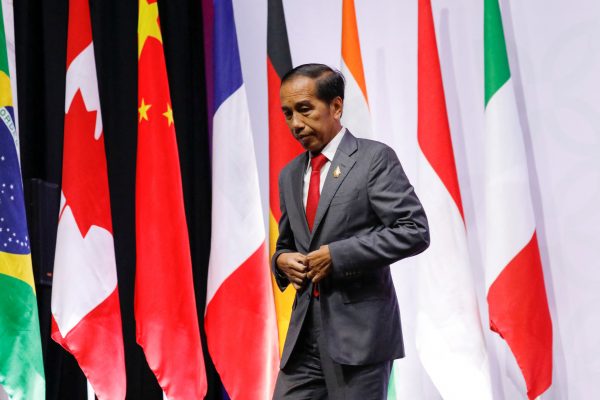When Jokowi’s son Gibran Rakabuming Raka was elected Mayor of Surakarta in 2021, Jokowi joined the ranks of Indonesia’s other two living presidents, Megawati Sukarnoputri and Susilo Bambang Yudhoyono, as heads of political dynasties. Their children currently occupy positions in regional and central governments, as well as national political parties.
Former president Megawati Sukarnoputri, the daughter of Indonesia’s founding president Sukarno, is the matriarch of a dynasty now three generations old which controls Indonesia’s largest political party, the Indonesian Democratic Party of Struggle (PDI-P). Agus Harimurti Yudhoyono heads the party his father founded, Partai Demokrat, and looks likely to be named as former governor of Jakarta Anies Baswedan’s running mate in the 2024 presidential race. Dynastic politics in modern democratic Indonesia is well and truly entrenched, forming the bedrock of several leading political parties.
The biggest difference between these and the Widodo dynasty-building project is that the family does not yet have an exclusive political vehicle in the form of its own party. As it stands, the Widodo’s are dependent on decisions made by the PDI-P executive — namely, Megawati.
The Widodo family is currently riding an unrivalled wave of momentum that comes with Jokowi’s overwhelming popularity and, for the moment at least, the heft of the PDI-P’s backing. But the course of the Widodo dynasty remains uncertain, including whether PDI-P support will last beyond Jokowi’s presidency and if the PDI-P is capable of supporting two dynastic families simultaneously.
Unlike Indonesia’s multigenerational political dynasties, whose longevity and autonomy allows them a level of resilience, the first challenge for the Widodo family will be to ‘bed down’ its successor generation. Of immediate concern is securing incumbency for family members currently in politics. In addition to Gibran, Jokowi’s son-in-law Bobby Nasution is in his first term as Mayor of Medan. Gibran and Bobby’s re-election or ascension to new positions in the 2024 elections will prove decisive.
Both men have asserted their ambitions to run for governorships — Central Java or Jakarta for Gibran, and North Sumatra for Bobby. To date, the PDI-P executive has not affirmed these moves, though offers of support and invitations from elsewhere may force the party to assert its position sooner rather than later.
In January 2023, Jokowi’s youngest child Kaesang Pangarep, an entrepreneur, YouTuber and soccer club owner, indicated that he is also preparing to enter politics, though it is unclear if he will run on a PDI-P ticket or with another party.
For the second generation of the Jokowi dynasty, decisions about where and with whom they set their electoral targets are crucial. One strategic misstep can end in disaster. The Widodo family do not currently have the luxury of a family party machine to fall back on.
At all stages in the dynasty-building process, Jokowi has defended his family and individual members’ decisions to enter politics as just that. He rejects suggestions that his family is becoming a political dynasty, arguing that this infers that proper registration and electoral processes are being circumvented. He maintains that his children are receiving no such favours. Given that Jokowi does not have decisive powers within any political party to select candidates, this is not an altogether unreasonable claim.
General trends in perceptions of dynastic politics also matter, as does how the family manages their public image as they seek to expand. In the 2014 presidential election, commentators pointed to presidential candidate Prabowo Subianto’s wealthy background as off-putting for poorer voters compared to Jokowi’s humble beginnings. Jokowi’s children, who have received a similarly privileged upbringing, international education and access to elite levels of Indonesian society, present a different prospect for voters.
Kaesang’s December 2022 marriage to Miss Indonesia finalist Erina Gudoro was a turning point for the Widodo family’s image and profile. The ceremony at Surakarta’s Mangkunegara Palace was livestreamed, much in the style of a royal wedding. But the opulence on display also attracted significant criticism. A common challenge for dynastic families who come from humble origins is how to shift the family’s image into a new phase and bring voters along with them.
The rise of the Jokowi dynasty is a symptom of a political culture in Indonesia that is increasingly open to ‘family’ as another category of political actors alongside oligarchs and parties. It is also a symptom of a society in which corruption, conflicts of interest and nepotism go unchallenged in the absence of judicial checks and balances, which have been dismantled and undermined under Jokowi’s watch.
It remains to be seen if Indonesians have become sufficiently desensitised to a ‘politics as normal’ in which nepotism is unremarkable and endorsed at the ballot box. If they are not, then for the Jokowi family — an emerging political dynasty without its own party vehicle or a secured successor generation — the next 12 months are crucial. But if it is politics as normal, then the Widodo dynasty is well on its way to success in the manner of those that have come before it.
Jemma Purdey is Adjunct Fellow at the Australia-Indonesia Centre, Monash University, Australia.

